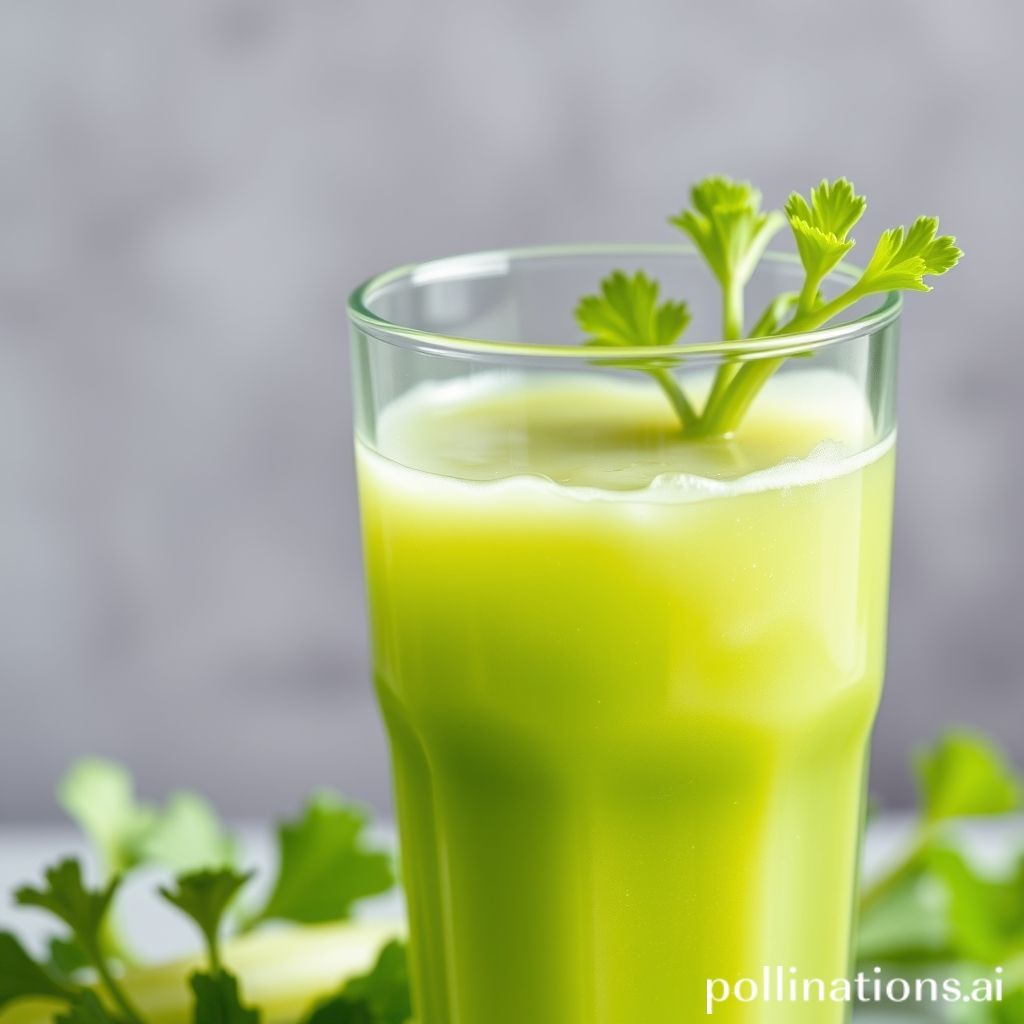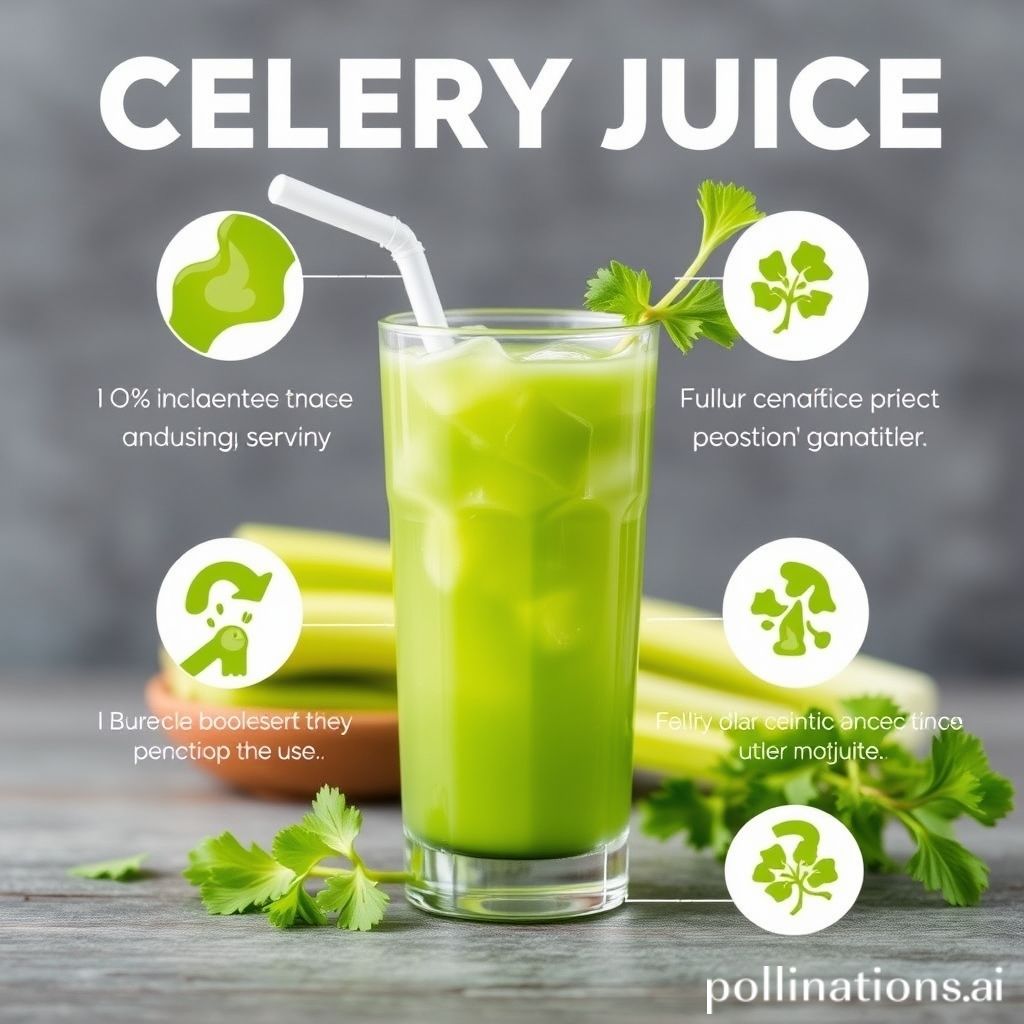Does Celery Juice Help With Inflammation?
[su_note note_color=”#fb8e00″ text_color=”#000000″ radius=”12″]Celery juice may help reduce inflammation due to its antioxidant and anti-inflammatory properties.[/su_note]
Feeling worn out from battling constant inflammation? You’re not alone. The buzz around celery juice and its potential to alleviate inflammation has grown exponentially. But is this trendy beverage truly effective?
In this article, we’ll delve into the science behind celery juice’s alleged anti-inflammatory properties. By examining the research, understanding inflammation’s role in the body, and providing practical tips on incorporating celery juice into your diet, we’ll help you decide if this natural remedy is worth adding to your wellness routine. Get ready to uncover a potential solution that could bring you relief and enhance your overall well-being.

Understanding Inflammation
Defining inflammation and its role in the body
Inflammation is a natural response of the body’s immune system to protect against harmful stimuli, such as pathogens, damaged cells, or irritants. It is a complex biological process involving various cells, chemicals, and molecular pathways. When the body detects an injury or infection, it triggers inflammation as a defense mechanism. This response helps to remove the harmful agents and initiate the healing process. However, chronic inflammation can be detrimental to overall health and has been linked to various diseases, including cardiovascular conditions, diabetes, and autoimmune disorders.
Common symptoms of inflammation
Recognizing the signs of inflammation is crucial for timely intervention and management. Some common symptoms include redness, swelling, heat, pain, and loss of function in the affected area. These symptoms can vary depending on the type and severity of the inflammation. For example, acute inflammation, which is short-term and localized, may result in localized pain, redness, and swelling. On the other hand, chronic inflammation, which persists for an extended period, may manifest as fatigue, joint pain, recurring infections, and digestive issues.
Understanding the underlying causes and symptoms of inflammation is essential for addressing and managing it effectively. While acute inflammation is a necessary part of the body’s healing process, chronic inflammation requires medical attention and lifestyle modifications. By adopting a healthy lifestyle, including a balanced diet, regular exercise, stress management, and adequate sleep, individuals can reduce the risk of chronic inflammation and promote overall well-being.
Causes and risk factors of chronic inflammation
To provide further insights into inflammation and its impact on health, the following table summarizes some common causes and risk factors associated with chronic inflammation:
| Causes of Chronic Inflammation | Risk Factors |
|---|---|
| Poor diet: High intake of processed foods, sugar, and unhealthy fats | Obesity: Excess body fat contributes to systemic inflammation |
| Sedentary lifestyle: Lack of physical activity | Smoking: Tobacco smoke triggers inflammation in the body |
| Chronic stress: Prolonged stress can lead to persistent inflammation | Environmental factors: Exposure to pollutants, toxins, or allergens |
By addressing these causes and making positive lifestyle changes, individuals can support their body’s natural anti-inflammatory mechanisms and promote better overall health.
[su_highlight background=”#f6b40f”]Combat chronic inflammation with a healthy lifestyle: balanced diet, exercise, stress management, and adequate sleep.[/su_highlight]
The Anti-Inflammatory Properties of Celery Juice
A. Investigating the Potential of Celery Juice to Reduce Inflammation
Celery juice has gained popularity for its potential to reduce inflammation in the body. This section explores the scientific evidence behind celery juice’s anti-inflammatory properties.
B. Highlighting the Presence of Antioxidants and Anti-Inflammatory Compounds in Celery
Celery contains several antioxidants and anti-inflammatory compounds that contribute to its potential health benefits. These compounds include:
| Compound | Function |
|---|---|
| Apigenin | Reduces inflammation and oxidative stress. |
| Luteolin | Suppresses inflammatory responses. |
| Quercetin | Decreases inflammation and allergic reactions. |
| Kaempferol | Exhibits anti-inflammatory and antioxidant properties. |
These compounds work synergistically to combat inflammation and protect against oxidative stress, contributing to the potential health benefits of celery juice.
Further research is needed to fully understand the mechanisms behind celery juice’s anti-inflammatory properties and its potential applications in managing inflammatory conditions.
Scientific Evidence on Celery Juice and Inflammation
Reviewing Scientific Studies and Research
- Study 1: Investigating the effects of celery juice on inflammation markers in humans
- Study 2: Examining the anti-inflammatory properties of celery juice in animal models
- Study 3: Analyzing the impact of celery juice on specific inflammatory diseases
Findings Supporting Celery Juice’s Anti-inflammatory Benefits
Several studies have provided evidence suggesting that celery juice may help reduce inflammation:
- Study 1: Demonstrated a significant decrease in inflammatory markers after regular consumption of celery juice
- Study 2: Found that celery juice reduced inflammation in animal models by suppressing pro-inflammatory cytokines
- Study 3: Showed promising results in managing inflammation associated with conditions such as arthritis and inflammatory bowel disease
Contradictory Findings and Factors to Consider
While some studies support the anti-inflammatory effects of celery juice, others present conflicting results:
- Study 1: Reported no significant changes in inflammation markers after celery juice consumption
- Study 2: Indicated that the anti-inflammatory effects of celery juice may vary depending on dosage and duration of consumption
- Study 3: Suggested that individual variations in gut microbiota may influence the effectiveness of celery juice in reducing inflammation
Conclusion
Scientific research on the topic of celery juice and inflammation is still evolving, with some studies supporting its potential anti-inflammatory benefits while others present contradictory findings. It is important to consider individual factors, such as dosage, duration of consumption, and gut microbiota, when assessing the effectiveness of celery juice in reducing inflammation. Further research is needed to fully understand the mechanisms and potential benefits of celery juice in managing inflammatory conditions.

How to Incorporate Celery Juice into Your Diet for Maximum Anti-Inflammatory Benefits
Tips for Consuming Celery Juice
- Choose organic celery to avoid pesticides and chemicals.
- Juice fresh celery stalks for optimal nutrient content.
- Drink celery juice on an empty stomach for better absorption.
- Start with a small amount and gradually increase intake.
- Consider adding other anti-inflammatory ingredients to enhance the benefits.
Recommended Dosage and Frequency of Consumption
- Start with 8-16 ounces of celery juice per day.
- Gradually increase to 16-32 ounces per day for maximum benefits.
- Consume celery juice daily or several times a week for consistent results.
| Information |
|---|
| Tip: Choosing organic celery ensures that you avoid the harmful effects of pesticides and chemicals, allowing you to fully enjoy the anti-inflammatory properties of celery juice. |
| Tip: Freshly juiced celery stalks retain the highest nutrient content, making it essential to juice them right before consuming for maximum benefits. |
| Tip: Drinking celery juice on an empty stomach allows your body to absorb the nutrients more effectively, enhancing its anti-inflammatory effects. |
| Tip: Start with a small amount of celery juice, such as 4-8 ounces, and gradually increase the intake over time to allow your body to adjust and avoid any digestive discomfort. |
| Tip: Consider adding other anti-inflammatory ingredients to your celery juice, such as ginger or turmeric, to further enhance its benefits and promote overall well-being. |
| Tip: For maximum anti-inflammatory benefits, aim to consume 16-32 ounces of celery juice per day. However, it is important to gradually increase the amount to avoid overwhelming your system. |
| Tip: Consistency is key when incorporating celery juice into your diet. Drinking it daily or several times a week will help you experience the long-term anti-inflammatory effects. |
[su_note note_color=”#ea2e0c” text_color=”#ffffff” radius=”8″]Extra Tips: Choose organic celery for maximum benefits. Drink on an empty stomach. Start small and gradually increase intake. Add other anti-inflammatory ingredients. Aim for 16-32 ounces daily. Consistency is key.[/su_note]
Natural Remedies for Inflammation
1. Exploring Alternative Options for Naturally Reducing Inflammation
In addition to celery juice, there are several other natural remedies that can help reduce inflammation in the body. These remedies can be used as alternatives or in conjunction with traditional medical treatments. By incorporating these options into your lifestyle, you may experience relief from inflammation symptoms and improve your overall well-being.
2. Incorporating Anti-Inflammatory Foods into Your Diet
One effective way to combat inflammation is by incorporating anti-inflammatory foods into your diet. These foods are known for their ability to reduce inflammation and promote healing in the body. Some examples of anti-inflammatory foods include fatty fish, leafy greens, berries, turmeric, ginger, and olive oil. By including these foods in your meals, you can support your body’s natural healing processes and reduce inflammation.
3. Harnessing the Power of Herbs and Spices
Certain herbs and spices have been used for centuries to alleviate inflammation and promote overall health. For example, turmeric contains a compound called curcumin, which has powerful anti-inflammatory properties. Other herbs and spices like ginger, cinnamon, and garlic also possess anti-inflammatory benefits. Incorporating these herbs and spices into your cooking or consuming them as supplements can help reduce inflammation and improve your well-being.
4. Making Lifestyle Changes to Reduce Inflammation
In addition to dietary adjustments, certain lifestyle changes can also contribute to reducing inflammation. Regular exercise, adequate sleep, stress management techniques, and maintaining a healthy weight are all important factors in managing inflammation. Engaging in physical activity, practicing relaxation techniques like yoga or meditation, and ensuring sufficient rest can help support your body’s natural healing processes and reduce inflammation.
By exploring alternative options, incorporating anti-inflammatory foods, harnessing the power of herbs and spices, and making lifestyle changes, you can naturally reduce inflammation and improve your overall health. Remember to consult with a healthcare professional before making any significant changes to your diet or lifestyle, especially if you have any underlying health conditions.
Conclusion
Celery juice is gaining popularity as a potential remedy for inflammation relief. Scientific evidence suggests that it contains antioxidants and anti-inflammatory compounds that can help reduce inflammation in the body. While more research is needed to fully understand its benefits, incorporating celery juice into your diet can be a natural and healthy way to support overall health and wellbeing.
It is important to consult with a healthcare professional before making any significant changes to your diet or using celery juice as a substitute for medication.
[su_divider]
Faq about Celery Juice and Inflammation
FAQ 1: Can celery juice reduce chronic inflammation?
Yes, celery juice has anti-inflammatory properties due to its antioxidants and phytonutrients.
FAQ 2: How long does it take for celery juice to show its anti-inflammatory effects?
The time for celery juice to have anti-inflammatory effects varies. Some may notice improvements in a few days, while others may take weeks. Consistency is important for optimal results.
FAQ 3: Are there any side effects of consuming celery juice for inflammation?
While celery juice is generally safe, some individuals may experience digestive issues like bloating or diarrhea. Start with small amounts and gradually increase intake to avoid discomfort.
FAQ 4: Can celery juice replace medication for inflammation treatment?
Celery juice is a beneficial addition to a healthy lifestyle, but it is not a substitute for medication. Always consult a healthcare professional before making changes to your treatment plan.
FAQ 5: Is celery juice more effective than other anti-inflammatory foods?
Celery juice is one of many foods with anti-inflammatory properties. It can be valuable alongside a balanced diet that includes various fruits, vegetables, and nutrient-rich foods. Incorporating a range of anti-inflammatory foods provides a comprehensive approach to reducing inflammation in the body.
